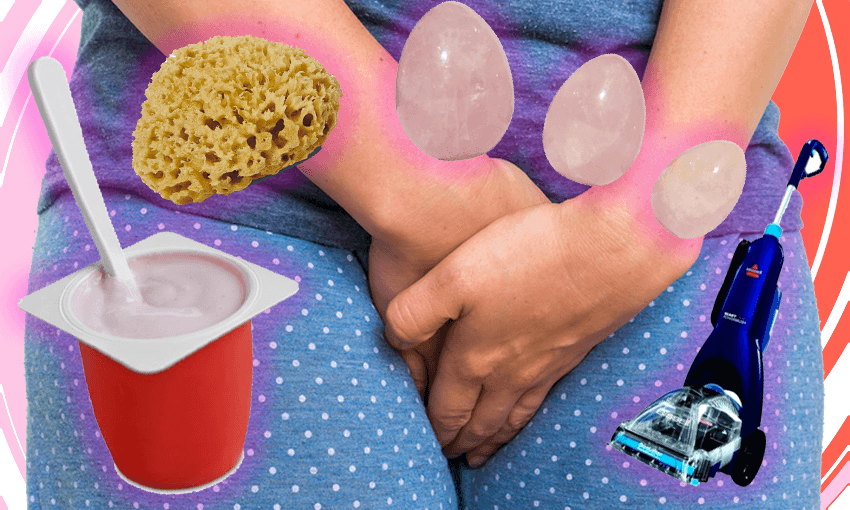The medical professionals at Family Planning New Zealand are uniquely qualified on the subject of things that go in and out of vaginas, so please listen to them when they tell you to stop putting these things up there.
It’s 2019, friends, and we wish we didn’t have to say this, but as an organisation that deals with vulvas and vaginas all day, we are becoming straight up alarmed at the number of bizarre products being touted on the internet as being in some way beneficial for vaginal health without any scientific evidence to back them up.
Products to either detox, balance hormones, cleanse or tighten the vagina are being endorsed by celebrities, influencers and fashion magazines without any concern for verifying the claims and the safety of the products. In fact, many of these products are down-right dangerous for your vaginal health, so we feel we need to set the record straight.
Here are five trends we have come across that we strongly discourage you to put anywhere near your vagina.
Jade eggs aka yoni eggs
Probably one of the more famous vaginal trends thanks to lifestyle websites endorsing and selling them. Online sellers claim that jade eggs help to strengthen pelvic floor muscles and vaginal muscle tone, balance hormones and even detox and take away negativity. To be honest, if your vagina has too much negativity, it’s more likely because of a lack of reproductive rights than because you haven’t put a jade egg in it. Get better priorities, people! You should focus more on, say, actual problems like gender equality and leave pelvic health to the professionals.
These claims are irresponsible and have no scientific backing; on the contrary health professionals discourage use of jade eggs, as the stone they are made from is porous, increasing the risk of bacterial infections and toxic shock syndrome. If you’d like to strengthen your pelvic floor muscles, we recommend basic pelvic floor muscle exercises.
Period sponges
As an alternative to less environmentally friendly period products, such as single-use pads and tampons, period sponges have been gaining popularity. Period sponges are used like tampons – inserted into the vagina to soak up menstrual blood. They are actual sea sponges, which appeals to many people as it means they are all natural and fully biodegradable products, and they can also apparently be reused for up to a year.
But listen up – just because something is all natural does not mean it is all good for you.
Sea sponges have been found to carry dirt, sand, bacteria and mould; definitely not what you want to be inserting in your vagina. Too little research has been done on the safety of using sea sponges as a menstrual product, so this is definitely not a product we would recommend.
If you want to make your periods more low-waste, there are products like reusable pads, underwear and menstrual cups that are a lot safer than poor old Spongebob Periodpants.
Related:
Meet the man who wants you to glue your vagina shut
Revealed: New Zealand’s favourite vagina and vulva nicknames
Don’t put Gwyneth’s balls in your vagina: How to avoid celebrity quackery and pseudoscience
Douches
Many people believe they need to clean their vagina, and so they turn to douching. Douching involves squirting water or other fluids up in the vagina to “flush it out”.
The thing is, vaginas are perfectly capable of cleaning themselves, and the notion that they are dirty things that need to be cleaned is a symptom of a patriarchal view of women’s bodies.
The balance of bacteria in a normal, healthy vagina keeps it healthy and prevents infections. When you attempt to “clean” the vagina, in fact you are disrupting this healthy balance, making you more prone to infections. Also, squirting liquids up in your vagina can force liquid up into your uterus, putting you at risk of a number of serious health complications.
You do not need to clean your vagina at all. Just rinse your vulva in warm water when you’re having a shower and that’s it.
If you notice an unpleasant odour from your vagina, the best thing to do is talk to your GP or family planning clinic, as you may have an infection or other vaginal health problem.
Yoghurt
Yoghurt might be great for your acai bowl morning routine but it’s not going to cure your yeast infections. Sorry. For many years this myth has been circulating – that putting yoghurt inside your vagina will cure your yeast infection due to all the good bacteria in yoghurt that will help rebalance the bacteria in your vagina. This is simply not true. All it will do is make a mess and possibly cause further irritation. The only place you want to be putting yoghurt is in your mouth.
Steam
Another ridiculous and dangerous vaginal trend endorsed by celebrities with absolutely no evidence to back up the claims of its benefits is vaginal steaming.
Vaginal steaming is offered in a number of spas and beauty salons and involves sitting over hot water mixed with herbs. It is claimed to be able to detox the vagina, help ease period pains and even help with fertility.
There is no scientific evidence to support this, but there is evidence of women getting second degree burns from this practice and needing reconstructive surgery. Gynaecologists strongly discourage the practice of vaginal steaming, as not only do you risk burning the delicate skin around the vulva, but you also risk disrupting the healthy balance of bacteria and pH levels in your vagina, making you more prone to infections.
If you come across a trend similar to these ones above – maybe your friend suggests something, or you see something on social media, please stop, and engage your critical thinking facilities.
Are there reputable sources to back up these claims? Could someone who isn’t qualified to be giving advice about your body be making money off misinformation and the “wellness” industry? Are they using the word “yoni” but do not appear to be a follower of Shakti the Hindu goddess of creation?
The best thing to do is to talk to your GP or a nurse or doctor at your local family planning clinic before trying any new practice, even if they’re advertised as a “natural alternative”. Otherwise you could be putting yourself at risk of serious health complications.
Rose Stewart is a national nurse advisor for Family Planning New Zealand



